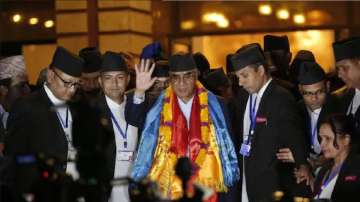Leaders of five-party ruling coalition began initiatives to form the government after winning 90 House of Representatives (HoR) seats out of 165 under the first-past-the-post (FPTP) electoral system. It was the first joint meeting of the ruling alliance after the recent elections.
Top leaders from the alliance on Monday met Prime Minister Sher Bahadur Deuba's official residence here to review the general elections and discuss the formation of a new government.
Who are key leaders in the coalition
Nepali Congress chief Deuba, senior leader Ram Chandra Paudel, vice-president Purna Bahadur Khadka, CPN (Maoist Center) Chairman Pushpa Kamal Dahal 'Prachanda', senior vice-chairman Narayan Kaji Shrestha, CPN (Unified Socialist) chair Madhav Nepal and Rastriya Janamorcha vice-chairperson Durga Paudel were among those who attended the meeting held at Baluwatar.
Voters repose faith in alliance
During the joint meeting, the top leaders of the ruling alliance expressed the view that the election results have re-confirmed the need and relevance of the alliance. In a joint statement issued after the meeting, the coalition leaders said that the results have pointed at the need for moving ahead forging mutual understanding and cooperation.
"It is necessary to continue the present coalition to face the challenges before the country," said the statement.
Senior NC leader and former deputy prime minister Prakash Man Singh told PTI that the meeting mainly dwelt on issues relating to power-sharing and formation of the government.
Prime Minister Deuba's Nepali Congress (NC) has emerged as the single largest party by winning 57 seats as the counting of votes under the direct system concluded on Monday. The CPN (Maoist Centre) has won 18 seats, CPN (Unified Socialist) 10, Loktantrik Samajwadi Party (LSP) 4 and Rastriya Janamorcha one.
Elections to the House of Representatives (HoR) and seven provincial assemblies were held on November 20 to end the prolonged political instability that has plagued the Himalayan nation. The counting of votes started a day later.
In the 275-member HoR, 165 will be elected through direct voting, while the remaining 110 will be elected through a proportional electoral system.
A party or a coalition needs 138 seats for a clear majority. According to Nepal's Election Commission, the opposition Communist Party of Nepal (Unified Marxist–Leninist) (CPN-UML) has bagged 44 seats.
The Rastriya Swatantra Party (RSP), the Rastriya Prajatantra Party (RPP) and the Janata Samajwadi Party (JSP) have won seven seats each. The Loktantrik Samajwadi Party and Nagarik Unmukti Party have won 4 and 3 seats respectively, it said.
Nepal Workers and Peasants Party and Janamat Party have won one seat each. The independent candidates have won five seats, it added.
Also Read: Covid was man-made virus, claims ex-Wuhan lab scientist
Latest World News

